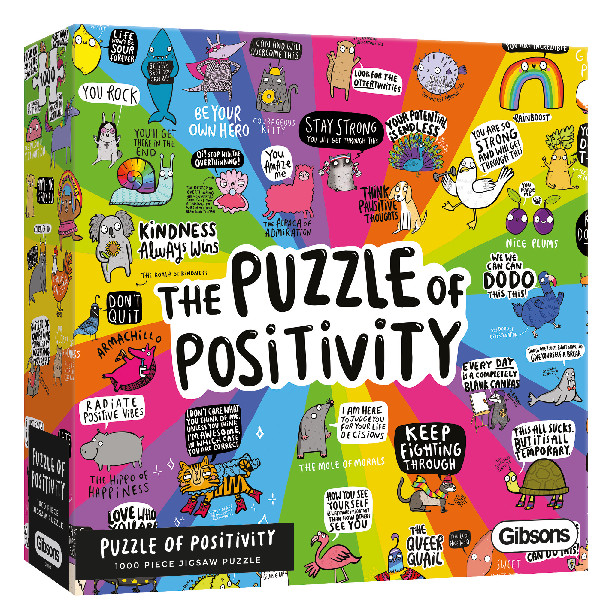The mental side of the game – puzzles, positivity and performance
• Elite athletes from the worlds of tennis, hockey and rugby turning to performance-enhancing jigsaws to unwind
• …and they’re joined by almost a third of Brits, with new poll highlighting link between puzzling, positivity, happiness
• Ahead of a summer of sport – Wimbledon, Euros, Olympics, school sports days – Dr Andrea Furst, Sport and Performance Psychologist, shares her top brain stimulation tips to improve athletic performance

As nearly a third of Brits turn to jigsaw puzzles to help them mentally relax, turns out elite athletes are doing the same: reaching for a jigsaw ahead of matches to relax and wind down. A new poll highlights the link with completing a jigsaw and a positive mindset – almost a quarter (23%) of Brits say they feel an increased sense of positivity after puzzling, increasing to 27% for those who participate in sport.
According to the new survey* by Gibsons – the British jigsaw puzzle and board game company – a quarter of Brits feel an increased sense of happiness after completing a jigsaw puzzle. A further 22% say doing jigsaw puzzles has improved their mindfulness and reduced their anxiety.
Throughout lockdown, jigsaw puzzles helped stave off boredom with a fifth (21%) of Brits turning to jigsaw puzzles to help them through the past year. In fact, Google Trends data reveals that searches for “jigsaw puzzles” by Brits hit a record all time high during the first week of lockdown – the most significant spike since records began! Gibsons saw record demand for its jigsaws in the past 12 months, with sales growing a phenomenal 59%.
But jigsaw puzzles are more than just boredom busters…
Doing jigsaw puzzles has been shown to benefit the brain**, to be a mood-booster – completing a jigsaw puzzle causes the brain’s production of dopamine to increase, and this neurotransmitter helps make us feel happier and can impact our memory, confidence, motivation, and concentration. Plus, solving a jigsaw puzzle can help increase productivity, as it can help reset the brain, giving fresh energy for optimal performance and an increased sense of calm.
With a summer of sport on the horizon, Gibsons looked at how elite athletes are using jigsaws to relax their minds and improve performance.
British tennis No. 1 Johanna Konta said she turned to jigsaw puzzles, including a one thousand-piece Gibsons Puss in Books puzzle, during lockdown last year to “stay sane” ahead of Wimbledon 2020. The England Women’s Hockey Team has previously posted pictures on social media*** of them doing jigsaw puzzles together between training sessions. And YouTube footage**** of the England Men’s Rugby Team in the Japan 2019 World Cup training camp reveals them sharing the challenge and accomplishment of completing a jigsaw puzzle as a team in the evenings, to relax, unwind and bond.
Leading sport and performance psychologist, Dr Amanda Furst, works with British athletes and Olympians from a variety of sports, to enhance the mental side of their game. When asked about pre-competition preparation and the nerves experienced the night before, she says: “It’s completely natural to feel nervous, due to the pressure to perform, the night before a competitive performance. There are several strategies that can be employed to manage pre-game nerves. I encourage each athlete to experiment to land on what works for them in their competition preparation routines. Techniques and tools that promote athletes to be in the moment, and to develop ‘being present’ as a habit, are extremely effective for achieving mental clarity. A jigsaw puzzle is one such tool; it’s a relaxing form of entertainment that can act as a distraction and lift the mood via the sense of achievement it creates, as well as providing a break away from screens and social media. Jigsaw puzzles are also a wonderful medium to encourage interaction between teammates which can act to strengthen collaborative behaviour.”
Dr Andrea Furst – brain stimulation tips to improve athletic performance
• Train your mind like a muscle: adopt the same approach to training your mind as you do your body’s muscles. Take the time to learn about yourself and your mental approach, to then enable the improvement to your mental skills.
• Shake up your clever, but lazy brain: our brains like patterns and trends to conserve energy – so to make behavioural change you will have to direct your brain to dedicate the effort and work required to achieve your goals.
• One. Thing. At. A. Time: slow your thoughts down by focusing and engaging on one task at a time, multi-tasking typically results in a very busy, exhausted brain!
• And breathe: learn how to breathe effectively as breathing techniques will give your mind something to focus on and in turn, relax your mind and body.
• Be present: find activities to be fully engaged in, such as jigsaw puzzles as they can help quieten the mind and be in the present moment. When your attention is on shapes and pieces, rather than split every which way, it creates a calming effect and can help reduce stress and anxiety.
Jigsaw puzzles to try:
• Primary schoolers: Wonderful Wildlife a new 100-piece puzzle is just the trick for teaching little ones about the natural world. £10.50
• Teens: Jigsaw Puzzle for Rebel Girls 500-piece empowering puzzle celebrates queens, activists, scientists, artists and sporting champions throughout history. £10.50
• Adults: The new Puzzle of Positivity, a 1,000-piece puzzle in the Gibsons contemporary, design-led White Logo Collection. £14
• All available from www.gibsonsgames.co.uk
*The research was carried out online by Research Without Barriers – RWB, between 7th May 2021 and 10th May 2021, sample of 2,002 UK adults, all research conducted adheres to the UK Market Research Society (MRS) code of conduct (2019) RWB is registered with the Information Commissioner’s Office and complies with the DPA (1998)
**www.ncbi.nlm.nih.gov/pmc/articles/PMC6174231/
***www.instagram.com/p/BgyYyIvlF-M/https://www.instagram.com/p/BrPjlB9hLHG/
****www.youtube.com/watch?v=67LElw5SEGc
Biography, Dr Andrea Furst: mentalnotespsych.com/andreafurst/







